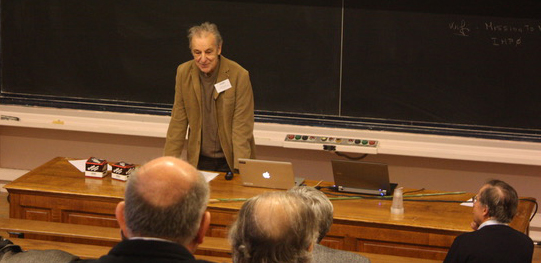News

Loup Verlet (1931-2019)
Loup Verlet, one of the founding fathers of computational Statistical Mechanics, passed away on June 13th at the age of 88. His early work and PhD thesis on high Energy Physics were initiated in the group of Victor Weisskopf at MIT and finalized under the guidance of Maurice Lévy at Ecole Normale Supérieure in Paris. He switched to Statistical Mechanics in the late 1950’s, when the Theoretical Physics group of ENS moved to the newly created Science Faculty at Orsay. His interest first focussed on numerical solutions of fluid integral equations, like the HNC equation and more advanced equations, the solution of which required Monte Carlo sampling.
During the sixties, Loup gathered a small group of PhD students working on various aspects of computational Statistical Mechanics, including variational Quantum Monte Carlo. In 1966 Loup was invited by Joël Lebowitz to New-York. They joined forces with Jerry Percus to lay the theoretical foundations of constant energy molecular dynamics within the microcanonical ensemble in their celebrated 1967 paper. Loup had been aware of Anees Rahman’s landmark 1964 paper on MD for a Lennard-Jones fluid. He used the CDC computer of the Courant Institute to develop a code based on 2 fundamental advances, namely the symplectic Verlet algorithm for the integration of coupled equations of motion, and the use of periodically updated neighbour tables, which reduces computational times from N2 to N*ln(N). On his return to Orsay in 1967, Loup and his students exploited his molecular dynamics code, as well as Monte Carlo codes, to investigate many aspects of static and dynamical properties of simple and complex, classical and quantum liquids. The emphasis of numerous collaborations was on combining analytic theory and simulation to tackle challenging problems.
In 1974, driven by the onset of societal problems, Loup turned to other areas of human endeavour, including psychoanalysis, environmental and social issues, and epistemology. On the latter subject, Verlet wrote 2 influential books, “La Malle de Newton” (in 1992) and “Chimères et Paradoxes” (in 2007). By carefully reading Newton’s “Principia Mathematica”, Loup discovered that his celebrated algorithm is in fact implicitly contained in the “Principia”!
Verlet had other passions, including mountain climbing and music; he was an excellent pianist and cellist. Loup had a charismatic personality with outstanding human qualities; he maintained excellent personal relationships with the other “pioneers” in the field, in particular with Berni Alder and Anees Raman. He was also a particularly caring and thoughtful thesis supervisor. Loup will be sorely missed.

 About
About
